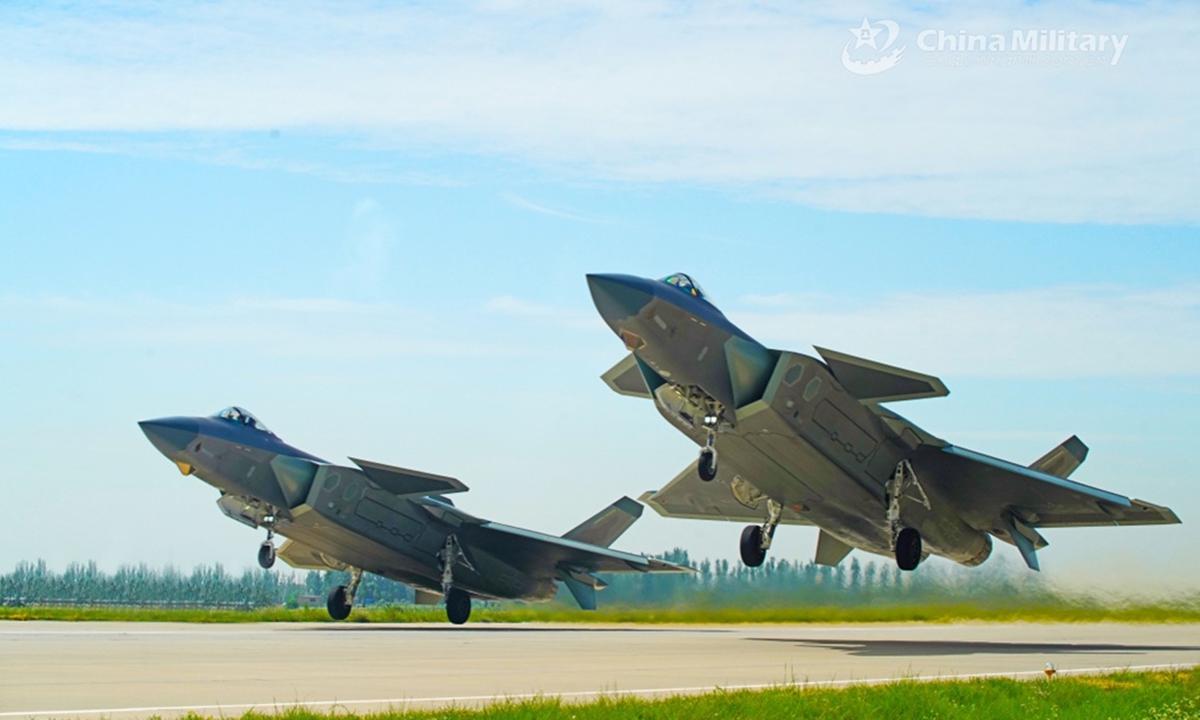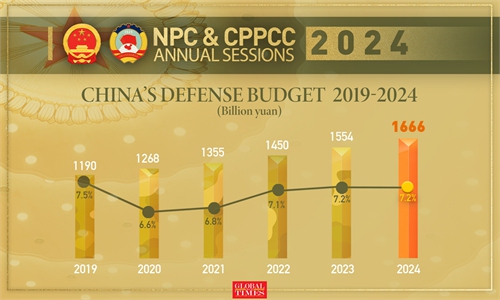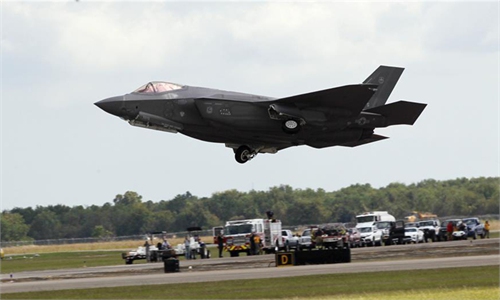Japan in no position to point fingers at China’s military expenditure: Global Times editorial

Two J-20 stealth fighter jets attached to an aviation brigade of the PLA Air Force take off for a flight training exercise in early February of 2024. Photo: eng.chinamil.com.cn/Liu Weipeng
Every year during the two sessions, two key figures attract significant external attention: the GDP growth target and the national defense budget. China's national defense budget this year is approximately 1.67 trillion yuan ($234.5 billion), with a growth rate of 7.2 percent, maintaining the same pace as the previous year. This marks the ninth consecutive year of single-digit growth in China's defense budget. As soon as this data is released each year, there is a round of hype about the "China military threat theory." This year, Japan took the lead in fueling this speculation.
On the day the data was released, Japan's Chief Cabinet Secretary Yoshimasa Hayashi promptly expressed "serious concerns" during a press conference. He claimed that "China has continuously boosted its national defense expenditures to strengthen its military power without sufficient transparency," calling it "the biggest, unprecedented strategic challenge." He also emphasized the need to respond with "Japan's full power and with the help of allies and like-minded nations." Japan's swift response aligns with its recent behavioral patterns in recent years and is not surprising. However, it is in no position to make such statements.
Look at Japan's defense budget for the fiscal year 2024, which has increased by 16.5 percent compared to the previous fiscal year, reaching a historic high. This is more than twice the growth rate of China's defense budget. This is still the case despite Japan being constrained by the peace constitution. The Asahi Shimbun, a Japanese newspaper, commented that such a large-scale budget has completely exceeded its own needs and is in an inflated state. After Japan passed the new "three security documents" at the end of 2022, its eagerness and actions to expand its military capabilities are aptly described as rapidly and extensively enhancing its military capabilities "without sufficient transparency." Especially considering Japan's historical aggression against neighboring Asian countries during its militaristic past, its current urgency to break through the peace constitution poses a risk to the security environment in the Asia-Pacific region.
China has always adhered to a defensive national defense policy, insisting on never seeking hegemony, expansion, or spheres of influence. However, China has national interests that need to be defended, especially the core interests of maintaining sovereignty and territorial integrity. China is the only one among the five permanent members of the United Nations Security Council that has not yet achieved reunification. "Taiwan independence" and external interference forces have been seeking opportunities to cause trouble, requiring China to strengthen its national defense capabilities. The world is not peaceful, and the stronger the People's Liberation Army as a force for peace is, the more effectively it can safeguard regional and global peace and stability. Japan uses the international community as a cover, but it can only represent itself. The international community does not harbor ill intentions toward China and does not perceive a "threat" from China's defense construction, only will feel security.
Is a 7.2 percent increase significant? Answering this question requires a comparison both horizontally and vertically. The proportion of military spending in China's GDP has been maintained at less than 1.5 percent for many years, while in the US, this proportion is over 3 percent. In terms of per capita military spending, the US is more than 15 times that of China. The US has forcibly required other NATO countries to increase military spending to over 2 percent of their respective GDPs. Although Japan is not a NATO country, it voluntarily aligns with this standard. The increase in Japan's defense budget this year is not accidental, and it is expected to remain at a similar level for at least the next three years.
As the spokesperson for the second session of the 14th National People's Congress pointed out on Tuesday, compared with military powers such as the US, China's defense spending, whether as a percentage of GDP, as a percentage of national fiscal expenditure, or in terms of per capita national defense expenditure and per capita military expenditure, has always been relatively low.
There is also a problem of reverse causation here. To a certain extent, it is precisely the security pressure imposed on China by Western countries, including Japan, in various ways, that has made China unable to relax, leaving it no choice but to strengthen its national defense construction. This, in turn, is used by Western countries to hype up the "China military threat theory." China is a great country in human history that has achieved super-scale development in a completely peaceful manner like never before. China's image as a peaceful and restrained major country is deeply rooted in the world. Only those with ulterior motives, who want to suppress China's normal military development and disrupt China's military modernization development in the name of deterrence, will make an issue of and point an accusing finger at China's reasonable increase in military spending.


